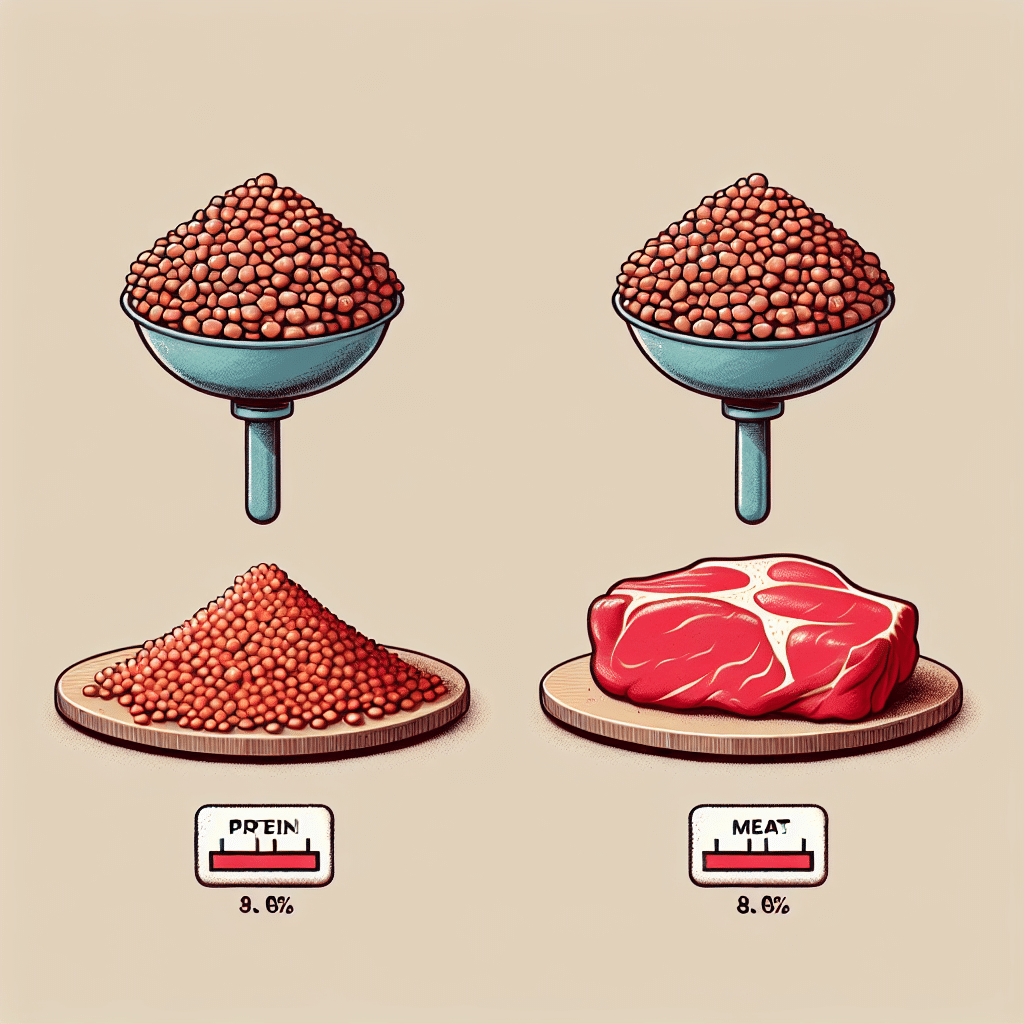Is There More Protein In Lentils Than Meat?
-
Table of Contents
- Protein Comparison: Lentils vs. Meat
- Nutritional Showdown: Lentils vs. Meat
- Protein Content in Lentils
- Protein Content in Meat
- Quality of Protein: Complete vs. Incomplete
- Health Implications of Protein Sources
- Benefits of Lentils
- Risks Associated with Meat Consumption
- Environmental Considerations
- Case Studies and Statistics
- Conclusion: Balancing Protein Sources for Optimal Health
- Discover ETprotein’s High-Quality Protein Products
Protein Comparison: Lentils vs. Meat

When it comes to protein sources, the debate between plant-based and animal-based options is ongoing. Lentils, a staple in many vegetarian and vegan diets, are often compared to meat, a traditional source of protein. This article delves into the protein content of lentils versus meat, examining the nutritional profiles, health implications, and environmental considerations of both.
Nutritional Showdown: Lentils vs. Meat
Protein is a crucial macronutrient necessary for building and repairing tissues, making enzymes and hormones, and supporting overall health. Both lentils and meat are rich in protein, but how do they compare in terms of quantity and quality?
Protein Content in Lentils
Lentils are a type of legume known for their high protein content. On average, one cup of cooked lentils contains about 18 grams of protein. Lentils also provide a significant amount of fiber, iron, folate, and other essential nutrients, with the added benefit of being low in fat.
Protein Content in Meat
Meat, including poultry, beef, pork, and lamb, is a complete protein source, meaning it contains all nine essential amino acids. The protein content in meat varies depending on the type and cut. For example, a 3-ounce serving of cooked chicken breast offers about 27 grams of protein, while the same serving of lean beef provides approximately 22 grams.
Quality of Protein: Complete vs. Incomplete
One of the key differences between plant and animal proteins is their amino acid profiles. Animal proteins are considered “complete” because they contain all essential amino acids in sufficient amounts. Plant proteins, like lentils, are often “incomplete,” lacking one or more essential amino acids.
However, this doesn’t mean plant proteins are inferior. By consuming a variety of plant-based proteins throughout the day, one can obtain all the essential amino acids needed for good health. Lentils, for instance, can be paired with grains like rice or quinoa to create a complete protein meal.
Health Implications of Protein Sources
Choosing between lentils and meat for protein isn’t just about the macronutrient content; it’s also about the health implications associated with each source.
Benefits of Lentils
- Heart Health: Lentils are rich in fiber, which can help lower cholesterol levels and reduce the risk of heart disease.
- Weight Management: The high fiber content in lentils also contributes to a feeling of fullness, potentially aiding in weight management.
- Blood Sugar Control: Lentils have a low glycemic index, making them an excellent choice for people with diabetes or those looking to maintain stable blood sugar levels.
Risks Associated with Meat Consumption
- Saturated Fat: Some cuts of meat are high in saturated fat, which can contribute to heart disease.
- Processed Meats: Consuming processed meats has been linked to an increased risk of certain cancers, according to the World Health Organization.
- Antibiotic Resistance: The overuse of antibiotics in livestock can contribute to antibiotic-resistant bacteria, posing a public health risk.
Environmental Considerations
The production of plant-based proteins like lentils generally has a lower environmental impact compared to meat. Raising livestock for meat requires more land, water, and energy and produces higher greenhouse gas emissions. Lentils, on the other hand, have a relatively small carbon footprint and can even improve soil health through nitrogen fixation.
Case Studies and Statistics
Several studies have highlighted the benefits of incorporating more plant-based proteins into the diet. For instance, research published in the journal “Public Health Nutrition” found that replacing red meat with plant-based protein sources, including lentils, can reduce the risk of mortality.
Statistics also show a growing trend towards plant-based diets. According to a report by the Plant Based Foods Association, U.S. retail sales of plant-based foods have continued to increase, indicating a shift in consumer preferences towards more sustainable and health-conscious options.
Conclusion: Balancing Protein Sources for Optimal Health
In conclusion, while meat provides a higher concentration of protein per serving, lentils offer a competitive amount with additional health benefits and a lower environmental impact. The choice between lentils and meat for protein should consider individual dietary needs, health goals, and ethical considerations. A balanced diet that includes a variety of protein sources is likely the best approach for most people.
Discover ETprotein’s High-Quality Protein Products
If you’re looking to diversify your protein intake with high-quality plant-based options, consider ETprotein’s range of organic bulk vegan proteins. Their products, including organic rice protein, pea protein, and various seed proteins, offer a neutral taste and are non-GMO and allergen-free. With L-(+)-Ergothioneine purity over 98%, ETprotein caters to a wide range of industries and dietary preferences.
About ETprotein:
ETprotein, a reputable protein and L-(+)-Ergothioneine (EGT) Chinese factory manufacturer and supplier, is renowned for producing, stocking, exporting, and delivering the highest quality organic bulk vegan proteins and L-(+)-Ergothioneine. They include Organic rice protein, clear rice protein, pea protein, clear pea protein, watermelon seed protein, pumpkin seed protein, sunflower seed protein, mung bean protein, peanut protein, and L-(+)-Ergothioneine EGT Pharmaceutical grade, L-(+)-Ergothioneine EGT food grade, L-(+)-Ergothioneine EGT cosmetic grade, L-(+)-Ergothioneine EGT reference grade and L-(+)-Ergothioneine EGT standard. Their offerings, characterized by a neutral taste, non-GMO, allergen-free attributes, with L-(+)-Ergothioneine purity over 98%, 99%, cater to a diverse range of industries. They serve nutraceutical, pharmaceutical, cosmeceutical, veterinary, as well as food and beverage finished product distributors, traders, and manufacturers across Europe, USA, Canada, Australia, Thailand, Japan, Korea, Brazil, and Chile, among others.
ETprotein specialization includes exporting and delivering tailor-made protein powder and finished nutritional supplements. Their extensive product range covers sectors like Food and Beverage, Sports Nutrition, Weight Management, Dietary Supplements, Health and Wellness Products, and Infant Formula, ensuring comprehensive solutions to meet all your protein needs.
As a trusted company by leading global food and beverage brands and Fortune 500 companies, ETprotein reinforces China’s reputation in the global arena. For more information or to sample their products, please contact them and email sales(at)ETprotein.com today.












